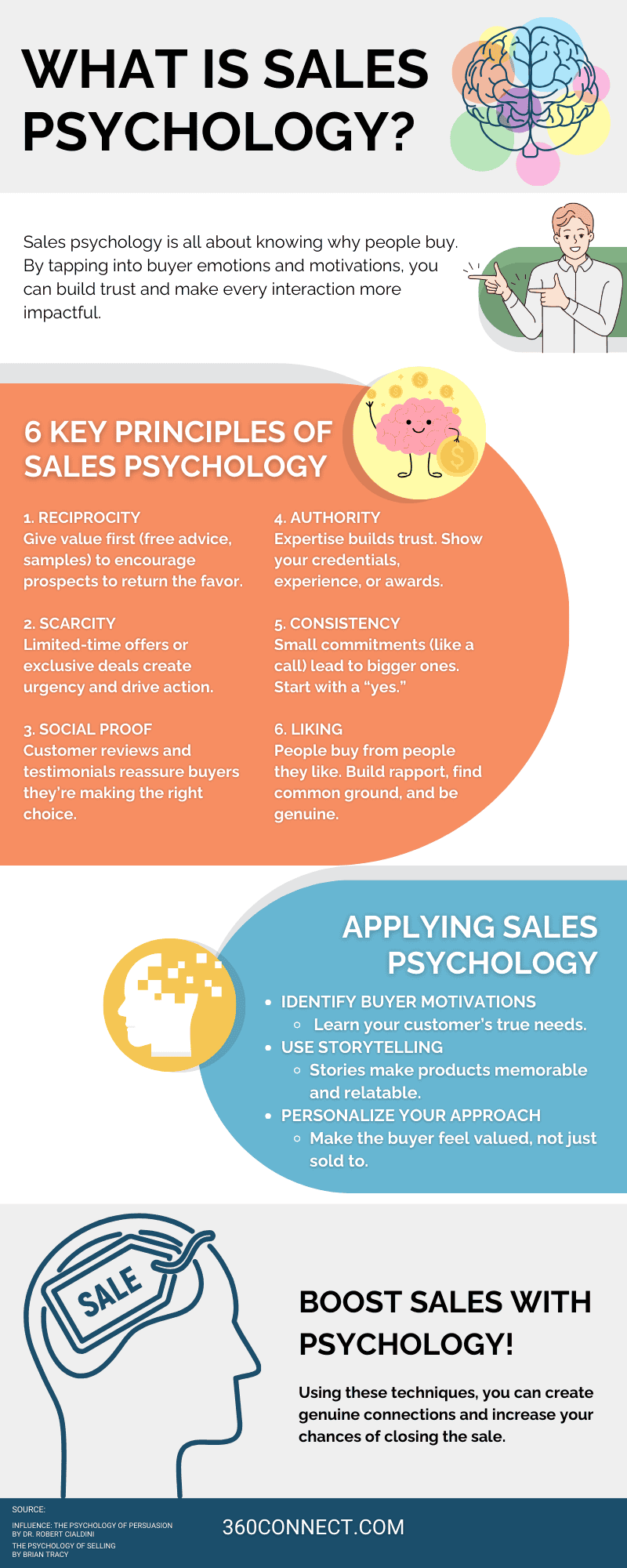Sales isn’t just about closing deals—it’s about understanding people. The best way to do this? Use sales psychology.
Sales psychology is the science of how our minds work in buying and decision-making— which is great to know when you’re trying to make a sale.
Let’s reel it back a bit to fully explain how this applies in the real world. Picture this: when you’re able to tune into what makes your prospects tick—their thoughts, feelings, and motivations—you’re already a step closer to winning their trust. And trust is what drives sales.
Too much of an overview? Well, you’re in luck because in this blog we’ll be diving deeper. We will be breaking down the basics of sales psychology, introduce some cool techniques you can use right away, and even spotlight a few must-read books on the topic. So, whether you’re looking to boost your sales skills or just understand what makes people buy, let’s dive into the psychology of selling!
What is Sales Psychology?
So, what exactly is “sales psychology”? Think of it as the ultimate tool for understanding what makes your customers say “yes.” It’s about knowing not just what people want, but why they want it. Every buying decision is influenced by a mix of thoughts, emotions, and needs—sales psychology helps you tap into these drivers to make your approach more personal and effective.
In other words, sales psychology isn’t about learning how to manipulate; it’s about connecting. When you understand what’s going on in your prospect’s mind, you can tailor your pitch to match their motivations and earn their trust naturally. It’s a win-win: they feel understood, and you build a real connection that leads to better sales outcomes.
In practice, sales psychology bridges the gap between what customers say and what they mean. For example, a buyer may express concerns over cost, but they might actually be worried about product quality or reliability. Through active listening and reading subtle cues, sales professionals can use psychology to understand these underlying concerns, helping to build trust and guide the buyer toward a solution that meets their needs.

How is Sales Psychology Used in Sales?
Now that you know what sales psychology is, let’s talk about how it’s used. In sales, psychology-based techniques are everywhere—from the first call to closing the deal. It involves creating rapport, reading nonverbal cues, and using storytelling to make a product or service feel relatable and trustworthy. The goal is to make customers feel understood, not pressured, which naturally encourages them to feel more confident in making a purchase.
For example, think about the power of storytelling. When you share a relatable story, it doesn’t just make your product sound good; it creates an emotional connection. Or consider mirroring, where matching a prospect’s tone or body language can help you build rapport faster. By understanding and applying these techniques, salespeople can connect with customers on a personal level.
Is Sales Psychology Needed for Sales Success?
“Is it really necessary?” you might ask. Well, let’s look at it this way—sales psychology gives you an edge in building genuine connections and closing more deals. But it’s not a one-size-fits-all; it depends on your sales approach and the type of sale. Here’s a closer look at when sales psychology can make a difference.
In complex or high-stakes sales, understanding buyer psychology is almost essential. When there’s more at stake, customers need to feel comfortable and confident about their choice. Sales psychology can help you identify concerns early and address them in a way that feels supportive, not pushy.
In simpler deals, it may not be as critical. If the product sells itself, buyers might need less reassurance. But for most B2B sales, where building a long-term relationship matters, a psychology-driven approach can transform how your buyers see you and your brand.
To sum it up, while sales psychology isn’t always necessary, it’s a powerful tool to have in your toolbox when it counts. Here’s a quick look at the pros and cons:
| Pros | Cons |
| Builds genuine connections | Can feel forced if overused |
| Improves close rates | Requires practice and consistency |
| Increases buyer trust | Not necessary for all deals |
| Enhances customer loyalty | Takes time to master |
Top 6 Principles of Sales Psychology
Dr. Robert Cialdini, a renowned psychologist, identified six powerful principles of persuasion in his book Influence: The Psychology of Persuasion. These principles—Reciprocity, Scarcity, Authority, Consistency, Liking, and Social Proof—have become cornerstones in understanding buyer psychology and are widely used in sales to encourage customer engagement and trust. Let’s dive into each one and explore how you can use these fundamentals in real-life sales situations.
1. Reciprocity
Ever notice how when someone does something nice for you, you want to do something nice in return? That’s reciprocity in action. In sales, this could mean offering a free resource, a trial, or even a personalized recommendation. When you give first, prospects often feel an urge to give back—by engaging more, responding to your pitch, or making a purchase.
2. Scarcity
People are naturally drawn to things that seem limited or exclusive. When something is scarce, it instantly feels more valuable. Think about how a “limited-time offer” or “exclusive deal” creates urgency. Scarcity nudges people to act quickly, making your product feel like a rare opportunity they don’t want to miss.
3. Social Proof
Humans are social creatures, and we often look to others when making decisions. Social proof is why customer testimonials, reviews, and case studies can be so persuasive. When prospects see others like them benefiting from your product, it reassures them that they’re making a smart choice.
4. Authority
People tend to trust experts. Establishing authority in your field—whether through sharing expertise, awards, or years of experience—builds credibility and makes you someone people want to listen to. When prospects see you as a trusted expert, they’re more likely to follow your guidance and feel confident in their choice.
5. Consistency
Once people commit to something, they’re likely to stay consistent with that commitment. In sales, this can mean encouraging small “yeses” early on. Each small agreement builds trust and familiarity, paving the way for larger commitments later on.
Related: Why Persistence is Key to Closing Sales
6. Liking
People are more likely to say “yes” to those they like. Building rapport, finding common ground, and showing genuine interest in the customer can make you more likable, which in turn makes the customer more receptive to your pitch.

How to Use Sales Psychology to Improve Your Sales
Alright, so how do you effectively apply sales psychology in your day-to-day? Here are some easy ways to get started:
Identify Your Buyer’s Motivation
Everyone has a reason for buying—whether it’s solving a problem or achieving a goal. Ask questions to find out what drives your prospect. The more you know, the more you can tailor your pitch to resonate with them.
Use Storytelling
Stories stick in people’s minds way better than plain facts. Share a success story or example that your prospect can relate to. In addition to making your product memorable, it also helps them understand how it could benefit them.
Make It Personal
Personalization goes a long way. Use your prospect’s name, reference their business goals, and find little ways to connect. It shows that you’re invested in them—not just in making a sale.
Many of these strategies align with insights from Brian Tracy’s The Psychology of Selling, which emphasizes the importance of understanding and connecting with your buyer on a personal level.

Key Books on Sales Psychology You Should Know
There’s a lot to learn from the experts, so let’s look at a couple of must-read books that dive deep into sales psychology.
Influence: The Psychology of Persuasion by Dr. Robert Cialdini
Dr. Robert Cialdini’s Influence is a foundational book for anyone in sales. We covered Cialdini’s six principles—Reciprocity, Scarcity, Authority, Consistency, Liking, and Social Proof—earlier, where we explained how these principles help create genuine connections and increase the likelihood of a positive response. Cialdini’s book goes into further detail, with research-backed insights on each principle and practical examples of how to apply them ethically in sales and beyond.
The Psychology of Selling by Brian Tracy
Brian Tracy’s The Psychology of Selling is another essential guide for salespeople looking to understand the psychology behind successful selling. Tracy focuses on practical strategies that help salespeople improve their mindset, set effective goals, and become skilled at handling objections and closing deals. Unlike Cialdini, Tracy’s focus is less on influence and more on practical, internal skills for personal development and sales success.
Key Takeaways:
- Develop a Positive Self-Concept – Confidence and a positive mindset are essential for success in sales.
- Set and Achieve Clear Goals – Having specific targets helps drive motivation and keeps salespeople focused. (Related: Goal Setting For Success)
- Become a Problem Solver – Position yourself as a resource to help the buyer, not just as someone selling a product.
- Understand Buying Motivations – Tracy emphasizes the importance of understanding the deeper reasons why customers make purchases.
- Master the Art of Closing – Tracy provides strategies for confidently closing sales without pressuring the customer.
- Continue Learning and Improving – Tracy encourages continuous self-improvement and skill development as keys to long-term success.
Tracy’s book offers a practical approach to understanding the mindset and strategies needed for successful selling. Many of the strategies we discussed earlier—such as identifying motivations, using storytelling, and personalizing interactions—reflect Tracy’s emphasis on genuinely connecting with the buyer. His approach encourages salespeople to not only build rapport and uncover needs but also to maintain a positive attitude and approach each interaction with genuine intent to help.

How to Implement Sales Psychology in Your Team
Implementing sales psychology can be simple and effective when tailored to each role. Here’s how business owners, sales managers, and salespeople can start using these principles today.
Business Owners
Lead by example and emphasize a customer-first approach. Align your company’s values and mission with your customers’ needs and train your team to do the same.
Sales Managers
As a manager, training your team in empathy and psychological principles can create a huge impact. Consider workshops or regular role-playing exercises to develop these skills. Additionally, provide feedback focused on building rapport and active listening.
Salespeople
Start small. Practice active listening, ask open-ended questions, and pay attention to body language cues. As you become more familiar with these techniques, you’ll find that connecting with buyers becomes more natural.
Conclusion
Sales psychology adds a whole new layer to the sales process. It helps you understand not just what your buyers want, but why they want it. Whether you’re looking to build trust, address objections, or boost close rates, applying these principles can make all the difference.
Ready to Use Sales Psychology on High-Quality Leads?
At 360Connect, we help suppliers like you connect with high-quality, verified leads DAILY. Taking the hassle out of finding new customers. Let us handle the lead generation, so you can focus on what you do best—selling!

